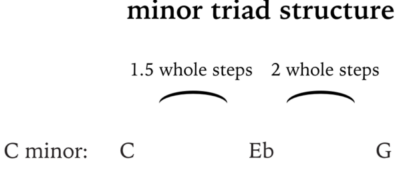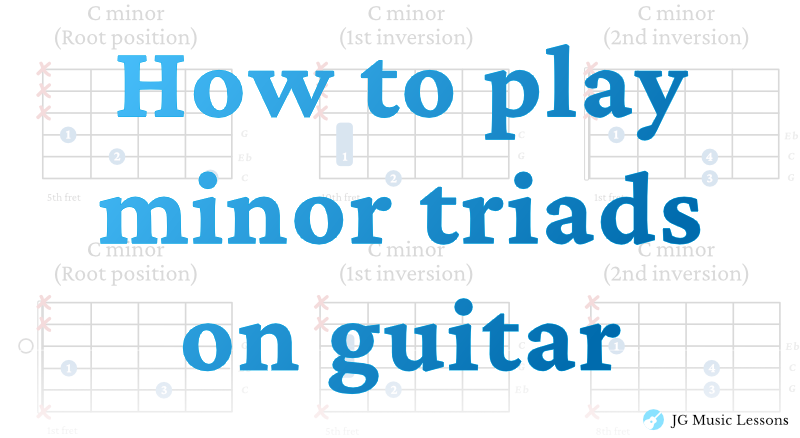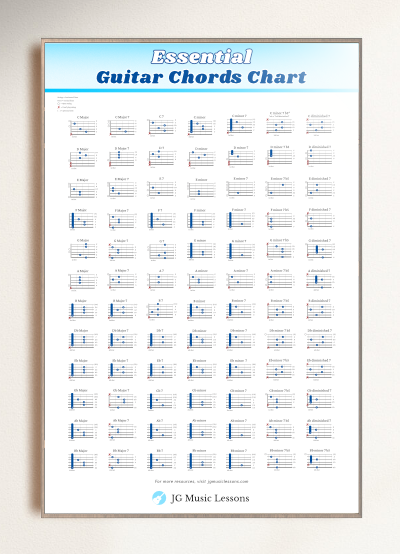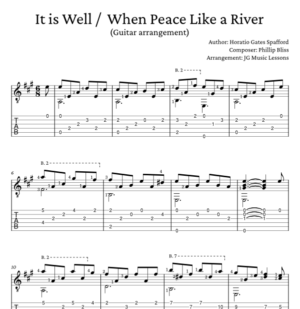In music, triads are the foundational building blocks used to create chords. We can use triads to outline the sound of a chord which is useful for creating melodies and for improvisation.
Although the concept is seemingly simple, working out the triads on the guitar will go a long way for various musical applications.
This lesson will cover how to play minor triads on the guitar, the inversions starting on different strings, arpeggio shapes throughout the fretboard and pattern exercises to practice them.
Grab your guitar and let’s get started!
What is a Minor Triad?
A triad is a chord made up of three notes, which can be played together or broken up into an arpeggio. A minor triad specifically uses the chord tones 1, b3, and 5. For example, a C minor triad includes the notes C, Eb, and G.
The formula to build a minor triad is: 1.5 whole steps from the root to the 3rd, and 2 whole steps from the 3rd to the 5th. See the image below for a visual breakdown.
Minor Triad Formula

In contrast, Major triads are built on 3 notes using the chord tones 1, 3, and 5. For example, a C Major triad has the notes C, E, and G. See the Major triads lesson here.
Minor Triads Chart
With this formula in mind, here is chart of the 12 minor triad chords.
| Minor triad chord | 1 | b3 | 5 |
|---|---|---|---|
| C minor triad | C | Eb | G |
| D minor triad | D | F | A |
| E minor triad | E | G | B |
| F minor triad | F | Ab | C |
| G minor triad | G | Bb | D |
| A minor triad | A | C | E |
| B minor triad | B | D | F# |
| Db minor triad | Db | E | Ab |
| Eb minor triad | Eb | Gb | Bb |
| Gb minor triad | Gb | A | Db |
| Ab minor triad | Ab | B | Eb |
| Bb minor triad | Bb | Db | F |
Minor triad shapes on different strings
The first step to learning minor triads is knowing the different ways to play it on one guitar string. We’ll use the C minor triad for these examples.
Minor Triads on the 6th string
Here are three ways you can play a C minor triad starting on the 6th string below.

Minor Triads on the 5th string
The three shapes starting on the 5th string follow the same pattern as the 6th string except we adjust the fingerings when including open strings.

Minor Triads on the 4th string
The minor triad shapes starting on the 4th string look slightly different than the 6th and 5th string triad shapes.

Minor Triads on the 3rd string
The minor triad shapes starting on the 3rd string also have unique triad shapes that look different from the ones on the other strings.

All of these minor triad shapes can be applied to any root note on the same string. Make sure to adjust the fingerings whenever open strings are included.
Minor Triad inversions
After learning the minor triads starting on each string, the next step is to learn the chord inversions. In short, a chord inversion is when you play the chord start on different chord tones.
For example:
- Root position is when you on the root note in the bass (lowest note).
- 1st inversion is when you have the 3rd of the chord in the bass.
- 2nd inversion is when you have the 5th of the chord in the bass.
Here is what this looks like in music notation for a C minor triad.

Now let’s look at how to play a minor triad and it’s inversions starting on different strings below.

Minor Triads Guitar Chord Charts
The following charts show you what the minor triads look like in chord form for each string.
Minor triad chords on the 6th string

Minor triad chords on the 5th string

Minor triad chords on the 4th string

Minor triad chords on the 3rd string

When playing chord with open strings, make sure to adjust these fingerings to what is most comfortable for you.
Minor Triad Arpeggios Shapes
For the previous examples, we have been learning minor triads horizontally across one string. In this section, we’ll be looking at the vertical triad shapes throughout the fretboard. Again, we’ll be using the C minor triad for the following examples.
Arpeggio shape 1

Arpeggio shape 2

Arpeggio shape 3

Arpeggio shape 4

Arpeggio shape 5

Keep in mind that fingerings change whenever you have open strings included in a triad. Experiment with different fingerings to see what works best for you.
Connecting Arpeggio Shape – Two Octaves
Here is an example of how to connect the minor triad shapes throughout the fretboard. We’ll be using the E minor triad for this example.

Minor Triad Exercises
The following exercises can be applied to any of the arpeggio shapes on the fretboard. Here are some pattern exercises over one area of the fretboard using the C minor triad.
3 Note Pattern
After playing three consecutive notes of a triad, repeat the pattern on the second to last note (E, G, B then G, B, E, etc…)

4 Note Pattern
After playing four consecutive notes of a triad, repeat the pattern on the second to last note (E, G, B, E then G, B, E, G, etc…)

Note Skipping Pattern
For this pattern, you skip one note of the triad then repeat the pattern on the chord tone below it (E, B, then G, E, etc…)

Minor Triads Quiz
To test your knowledge on Major Triads, try to figure out the three chord tones for each of the chords below. *Tip: When counting the steps between notes, the notes B to C and E to F are the exceptions which are a half step apart.
- F minor triad
- D minor triad
- A minor triad
- B minor triad
- G minor triad
- E minor triad
- Bb minor triad
(Answers revealed in the next section).
Minor Triad Quiz Answers
Here is the answer key for the previous quiz questions.
- F, Ab, C
- D, F, A
- A, C, E
- B, D, F#
- G, Bb, D
- E, G, B
- Bb, Db, F
Wrapping up
Triads are a simple yet powerful way to outline chord harmony, and learning how to play minor triads across different strings, in their various inversions, and as arpeggio shapes opens up a lot of musical possibilities.
To fully internalize them, try practicing these shapes and exercises in different keys. This will strengthen your fretboard awareness and help you connect musical ideas more fluidly.
Understanding triads not only helps you move more smoothly between chords, but also deepens your grasp of how the fretboard works. Triads are the building blocks of more complex chords and can be a great starting point for improvisation and creative playing.
The more fluently you can play and apply triads, the more freedom you’ll have to express musical ideas with confidence.
Want to keep learning? Check out these related lessons:
📘 Get the free guitar practice guide here!



